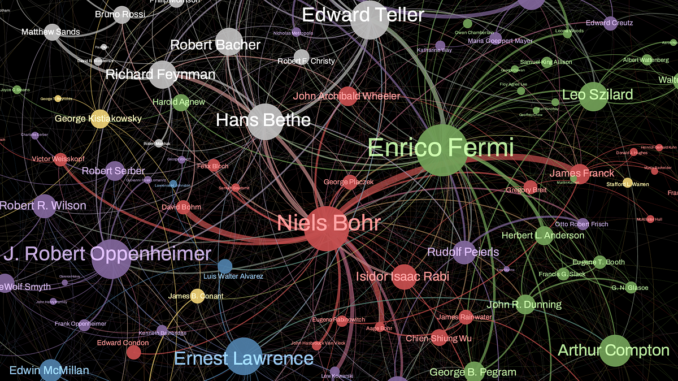
Published in Nightingale, Journal of the Data Visualization Society, September 12, 2023. Edited by Kathryn Hurchla.
The Manhattan Project was one of the largest scientific collaborations ever undertaken. It operated thanks to a complex social network of extraordinary minds and it became undoubtedly one of the most remarkable intellectual efforts of human history. It also had devastating consequences during and after the atomic bombings of Hiroshima and Nagasaki. Despite the loss of hundreds of thousands of human lives during the bombing and the subsequent events, the scientific journey itself stands as a testament to human achievement, as highlighted in Christopher Nolan’s film portrayal of Oppenheimer.
The scientific literature on collaboration, particularly the role of network connections in achieving success, is robust and has been further enriched by the current data boom. This wealth of data, represented by for instance millions of scientific papers, is exemplified in works such as “The Science of Science,” by D. Wang and A. L. Barabási [1]. Utilizing network analysis to uncover the intricate connections within the Manhattan Project aligns with my perspective as a physicist turned network scientist. Without further ado, here’s how I mapped the Manhattan Project into data and used that to create a network visualization of this historically significant collaborative project.
As with many data science projects, the first question revolved around data selection. While scientific publication data might seem logical, given the project’s scientific nature, this approach proved inadequate. The main reason for this was two-fold: First, some of the most important documents and papers could still be classified; and also, not everyone was active in science, as the operation was also heavily intertwined with politics and the military. Thus, resorting to collective wisdom, my focus shifted to Wikipedia, a global crowdsourced encyclopedia and a potential data source. Wikipedia offers a list of notable personnel connected to the project [2], encompassing more than 400 contributors from various fields. I used a straightforward web-scraping technique to collect data from Wikipedia…

Be the first to comment